g必修3Unit5LanguagePoints电子教案
人教版高中英语必修3 Unit5 Using language 优秀教学设计
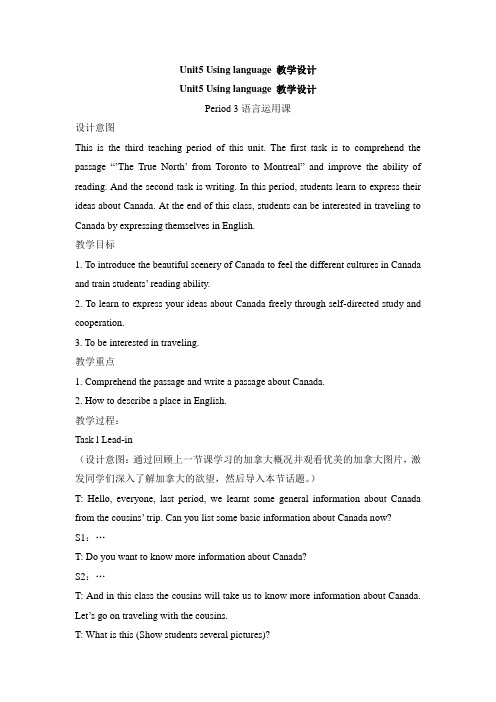
Unit5 Using language 教学设计Unit5 Using language 教学设计Period 3语言运用课设计意图This is the third teaching period of this unit. The first task is to comprehend the passage “’The True North’from Toronto to Montreal”and improve the ability of reading. And the second task is writing. In this period, students learn to express their ideas about Canada. At the end of this class, students can be interested in traveling to Canada by expressing themselves in English.教学目标1. To introduce the beautiful scenery of Canada to feel the different cultures in Canada and train students’ reading ability.2. To learn to express your ideas about Canada freely through self-directed study and cooperation.3. To be interested in traveling.教学重点1. Comprehend the passage and write a passage about Canada.2. How to describe a place in English.教学过程:Task l Lead-in(设计意图:通过回顾上一节课学习的加拿大概况并观看优美的加拿大图片,激发同学们深入了解加拿大的欲望,然后导入本节话题。
高一英语必修3 Unit5教案

高一英语必修3 Unit5教案Unit5canada—“TheTrueNorth”I.单元教学目标技能目标SkillGoalsTalkaboutthebasicinformationaboutcanada—location,maincities,customsandculturaldiversity.Learnhowtoreadatravelingreportandusemaps.Learntoexpressdirectionsandpositions.mastertheNounclause-Appositiveclause.Learntowriteareporttoexpresswhatyouhearandseeinapla ce.II.目标语言功能句式表示方向的句式whereis...?Howdoesonegoto...?Inwhatdirectionis...?Is...closeto/farfrom...?Howfaris...?表示位置的句式Itis/liesinthenorth/southof...Itis/liestothesouth/east/northwestof...Itiswithin...kilometersof...Itis/liesonthewest/east.Theplaceisontheborder.yougoalongthecoast.Itiseast/westof...Itisfarawayfrom...onegoesnorthward.词汇.四会词汇Quizcanadianministercontinentbaggagechatsceneryeast wardwestwardupwardsurroundharbormeasureaboardeaglew ithinborderslightacreurbantopicmixmixturebushmaplef rostconfirmwealthydistancemistmistyschoolmateboothd owntownapproximatelydawnbuffetbroadnearbytraditiont errifyterrifiedpleasedimpressimpressive2.词组Primeminister,ratherthan,settledown,managetodo,catc hsightof,haveagiftfor,inthedistance语法NounclauseastheappositiveIII.教材分析与教材重组.教材分析本单元通过两位女孩李黛玉与刘茜的加拿大之旅,向我们展示了加拿大的一些基本概况,包括它的地理位置、主要城市、风土人情以及它的多元文化。
高中英语必修三教案:第5单元using+language.doc
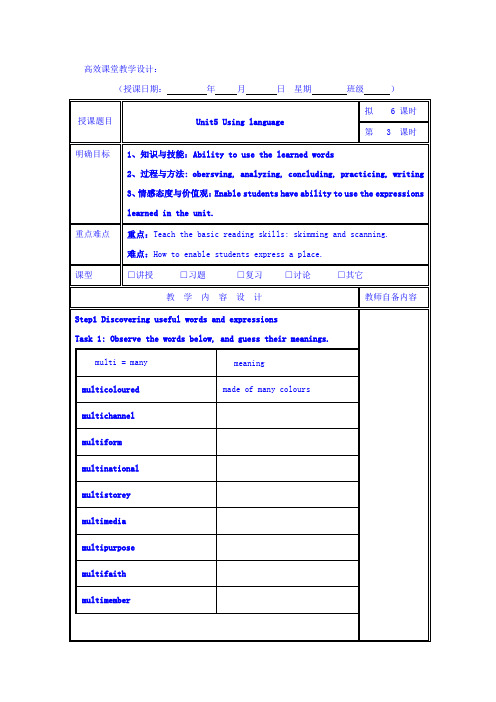
高效课堂教学设计:(授课日期:年月日星期班级)精美句子1、善思则能“从无字句处读书”。
读沙漠,读出了它坦荡豪放的胸怀;读太阳,读出了它普照万物的无私;读春雨,读出了它润物无声的柔情。
读大海,读出了它气势磅礴的豪情。
读石灰,读出了它粉身碎骨不变色的清白。
2、幸福幸福是“临行密密缝,意恐迟迟归”的牵挂;幸福是“春种一粒粟,秋收千颗子”的收获. 幸福是“采菊东篱下,悠然见南山”的闲适;幸福是“奇闻共欣赏,疑义相与析”的愉悦。
幸福是“随风潜入夜,润物细无声”的奉献;幸福是“夜来风雨声,花落知多少”的恬淡。
幸福是“零落成泥碾作尘,只有香如故”的圣洁。
幸福是“壮志饥餐胡虏肉,笑谈渴饮匈奴血”的豪壮。
幸福是“先天下之忧而忧,后天下之乐而乐”的胸怀。
幸福是“人生自古谁无死,留取丹心照汗青”的气节。
3、大自然的语言丰富多彩:从秋叶的飘零中,我们读出了季节的变换;从归雁的行列中,我读出了集体的力量;从冰雪的消融中,我们读出了春天的脚步;从穿石的滴水中,我们读出了坚持的可贵;从蜂蜜的浓香中,我们读出了勤劳的甜美。
4、成功与失败种子,如果害怕埋没,那它永远不能发芽。
鲜花,如果害怕凋谢,那它永远不能开放。
矿石,如果害怕焚烧(熔炉),那它永远不能成钢(炼成金子)。
蜡烛,如果害怕熄灭(燃烧),那它永远不能发光。
航船,如果害怕风浪,那它永远不能到达彼岸。
5、墙角的花,当你孤芳自赏时,天地便小了。
井底的蛙,当你自我欢唱时,视野便窄了。
笼中的鸟,当你安于供养时,自由便没了。
山中的石!当你背靠群峰时,意志就坚了。
水中的萍!当你随波逐流后,根基就没了。
空中的鸟!当你展翅蓝天中,宇宙就大了。
空中的雁!当你离开队伍时,危险就大了。
地下的煤!你燃烧自己后,贡献就大了6、朋友是什么?朋友是快乐日子里的一把吉它,尽情地为你弹奏生活的愉悦;朋友是忧伤日子里的一股春风,轻轻地为你拂去心中的愁云。
朋友是成功道路上的一位良师,热情的将你引向阳光的地带;朋友是失败苦闷中的一盏明灯,默默地为你驱赶心灵的阴霾。
人教版高中英语必修三教案unit5 Language points learning(2)
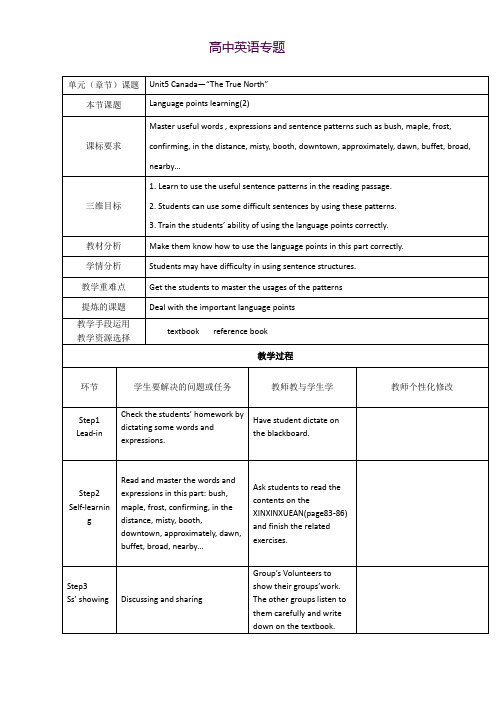
Deal with the important language points
教学手段运用
教学资源选择
textbook reference book
教学过程
环节
学生要解决的问题或任务
教师教与学生学
教师个性化修改
Step1
Lead-in
Check the students’ homework by dictating some words and expressions.
Share with the句式集训P 87 in新新学案
课后作业布置
分层测评14
预习内容布置
语法:同位语从句
教材分析
Make them know how to use the language points in this part correctly.
学情分析
Students may have difficulty in using sentence structures.
教学重难点
Get the students to master the usages of the patterns
三维目标
1. Learn to use the useful sentence patterns in the reading passage.
2. Students can use some difficult sentences by using these patterns.
3. Train the students’ ability of using the language points correctly.
Ask students to read the contents on the XINXINXUEAN(page83-86) and finish the related exercises.
人教版必修3高中英语必修3Unit5languagepoints
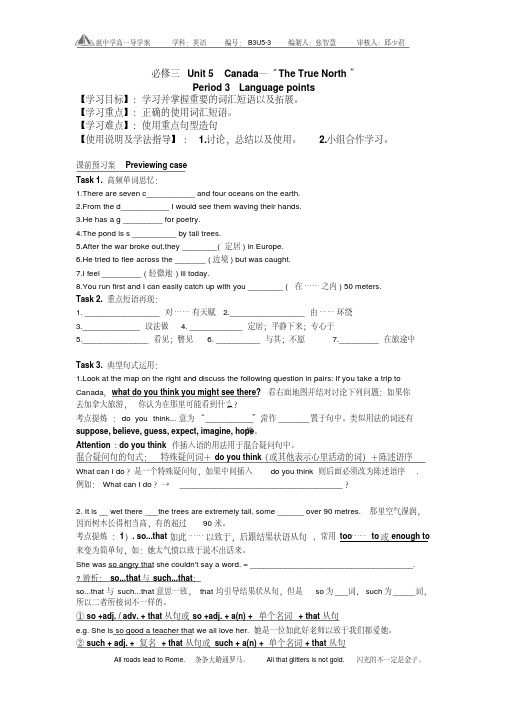
必修三Unit 5 Canada—“The True North”Period 3 Language points【学习目标】:学习并掌握重要的词汇短语以及拓展。
【学习重点】:正确的使用词汇短语。
【学习难点】:使用重点句型造句【使用说明及学法指导】: 1.讨论,总结以及使用。
2.小组合作学习。
课前预习案Previewing caseTask 1. 高频单词思忆:1.There are seven c___________ and four oceans on the earth.2.From the d___________ I would see them waving their hands.3.He has a g _________ for poetry.4.The pond is s __________ by tall trees.5.After the war broke out,they ________(定居) in Europe.6.He tried to flee across the _______ (边境) but was caught.7.I feel _________ (轻微地) ill today.8.You run first and I can easily catch up with you ________ (在……之内) 50 meters.Task 2. 重点短语再现:1. _________________ 对……有天赋2._________________ 由……环绕3._____________ 设法做4. ____________ 定居;平静下来;专心于5._______________ 看见;瞥见6. __________ 与其;不愿7._________ 在旅途中Task 3. 典型句式运用:1.Look at the map on the right and discuss the following question in pairs: If you take a trip to Canada,what do you think you might see there? 看右面地图并结对讨论下列问题:如果你去加拿大旅游,你认为在那里可能看到什么?考点提炼:do you think...意为“___________”,常作_______置于句中。
高一英语人教版必修三 Unit5 Using language 教案
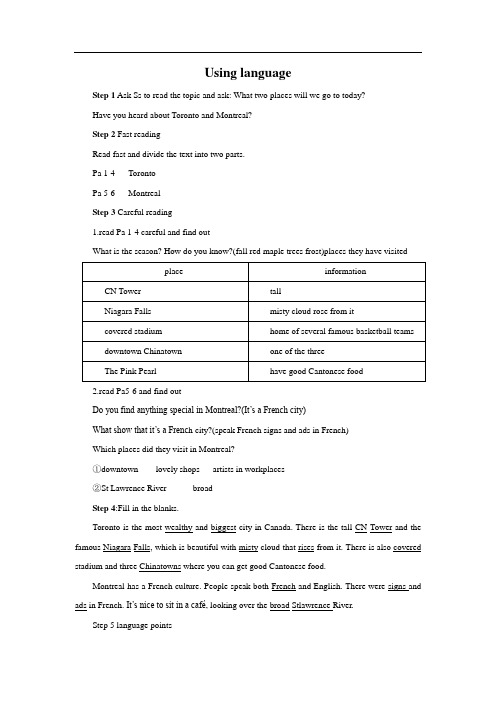
Using languageStep 1 Ask Ss to read the topic and ask: What two places will we go to today?Have you heard about Toronto and Montreal?Step 2 Fast readingRead fast and divide the text into two parts.Pa 1-4 TorontoPa 5-6 MontrealStep 3 Careful reading1.read Pa 1-4 careful and find outWhat is the season? How do you know?(fall red maple trees frost)places they have visited2.read Pa5-6 and find outDo you find anything special in Montreal?(It’s a French city)What show that it’s a Frenc h city?(speak French signs and ads in French)Which places did they visit in Montreal?①downtown lovely shops artists in workplaces②St Lawrence River broadStep 4:Fill in the blanks.Toronto is the most wealthy and biggest city in Canada. There is the tall CN Tower and the famous Niagara Falls, which is beautiful with misty cloud that rises from it. There is also covered stadium and three Chinatowns where you can get good Cantonese food.Montreal has a French culture. People speak both French and English. There were signs and ads in French. It’s nice to sit in a café, looking over the broad Stlawrence River.Step 5 language points1.wealthy /wealthOne percent of the people owned more than fifty percent of the wealth. He has earned a great deal of money and is now very wealthy.2.not…untilThey worked until 5:00 P.M. and then quit.They didn’t stop working until 5:00 P.M. and then quit.他们等着(不离开)直到雨止.They waited until the rain stopped.They didn’t leave until the rain stopped.3.go on a tour / a trip / a visit /a picnic4.in the distanceThe distance from my house to school is two blocks.A ship could be seen in the distance.It looks beautiful from a distance.5.rise/raisePrices have risen quickly.He raised his voice and shouted at the boy.He rose from his chair when the door bell rang.I was raised by my aunt.6.downtownHe works in a downtown office.Let’s go downtown today.7.as far asA young girl like her can only go as far as the river side.As far as I know, Toronto is a beautiful city.8.It’s about four hundred kilometers northeast of Toronto…我们学校位于公园南面500米处.Our school is 500 metres south of the park.塔位于城市东南1000 米处The tower is 1000 metres southeast of the city.9.at dawnat daybreak at sunrise at sunset at noon at dusk at night at midnight10.in small letters 用.以He expressed his idea in simple English.A message was written in pencil.He paid me in dollars.The room is painted in bright colours.11.be close toget close to12.Montreal is a city with wonderful restaurants and clubs.有条小溪,两边都是树.There was a little stream with green grass and big trees on both sides.这是个明亮的房间,金黄色的地板,粉红色的窗帘.It’s a bright room with golden floor and pink curtains.13.asA look of surprise came into her eyes as she read the message.As she sang, the tears ran down her cheeks.Step 6 Fill in the blanks.Last year, we went on a tour to WangShan. In the distance, we can see misty cloud rise among mountains. We climb as high as we can and look down from the top. The next morning, we got up at dawn to watch sunrise in the place which is 800 metres north of our hotel. WangShan is a place with wonderful sceneries.Step 7 Let students introduce Toronto and Montreal.Step 8 Ask students to introduce Taizhou, using words and phrases from the text. Then write it down.。
外研社必修三Module5教案电子教案.docx

外研社必修三Mod ul e5 教案科目Teaching ContentTeaching Objectives学习—————好资料Teaching Plan英语年级高一教师许宝玉Book 3 : Module 5 Great People and Great Inventions of Ancient China( Reading and Vocabulary)1. Knowledge aims:(1)To help students understand the words and some useful expressions(2)To get the students have a better understanding of the text( 3)To train the students’ ability of guess words’ meaning by read the sentence (4)Learn to introduce a great person from some aspects---names and thoughts2. Language ability aims:Theoretical basis: High school English curriculum standards emphasize the ability toacquire and process information in English1). Can get the main information from the article and extract the main points2). Can understand the subject of the article, the author's intention3). Can extract, filter and reorganize the information in the article4). Can use the context to guess new words(1)Learn to read with some reading strategies(2) Improve students ’ integrated abilitiesspeakingof and reading(3)Learn to introduce a great philosopher.3.Learning strategy aims:Vocabulary classificationEffective self-regulation during reading, English interaction, and task completion. Obtain relevant information through various channels, identify and apply effective resources.4.Cultural awareness and emotional attitude:To get the students learn more about the great people and great inventions of ancientChina 5. Teaching important points1.Know the pronunciations of new words. For the students, know the pronunciations of the words are really important. Only if they know them clearly, can they understand the words exactly.2. Talk about the great people and great inventions of ancient China. Get the general information about the great people, such as Confucius, Mozi and Mencius.学习—————好资料Teaching Material and Students Analysis 6. Teaching Difficult Points1.How to describe a great person. Description is difficult for the students; the teacher shouldguide them to introduce the person from some aspects. For example, the teacher can ask the students to describe the person from these aspects: names, birthplace,and thoughts.2.Let the students understand the passage better and let them grasp key words and phrases.The content of my lesson is Module 5 in New Standard English Book 3. This module is aboutthe Great People and Great Inventions of Ancient China. It introduces three famous people inChina. They are Confucius, Mozi and Mencius. By studying of this unit, we ’ ll enable students to know more about the great people and great inventions in ancient China. At the same time,let the students learn how to describe a person. Students in grade one in senior high school. /Average class/ They haven ’ t completely changed their smethodofstudying and cannotinvolve themselves in the class activities fully. They have difficulty in expressing themselvesin English clearly. Some students are not very interested in English.Teaching Aid Teaching ProcedureLead –in Pre-reading Blackboard; A recorder; Computer; A projectorThe teacher’ s activityShow Ss some pictures of great people in China and in theworld and ask them who is your most admired or respectedgreat people of China ?Task 1:Complete the gaps with the words in the box onpage41.Then ask individuals to show their answers.equal philosopher thinker treat state rulerphilosophy teachings war look afterTask 2:Q1: Do you know any philosopher of ancient China?Guess the people by what they said.Q2: Look at the pictures and answer thefollowingquestions.The students’purposeactivityStudents need to havLead ina brain-storm and 3minsspeakloudly.The students8minsdivide Strengthenthemselves into basisgroups andwork togetherand give out theanswers.Ss can have avivid and afurtherunderstanding学习—————好资料Who is he? What was his main idea?of the personPre-and keep their learninginterest inlearning.Task 3:While –reading Read these statements and tick the ideas that Confuciustaught.Skimming:Task 1:Ss should read the material fast to find the words andphrases in the passage that match these definitions. Task 2:Ask students to read the passage as quickly as they can,then read questions on the screen and choose the correctanswers.Students readthe sentencesand make achoice.The studentsread the 25minspassagecarefully andgive out theanswers.Scanning:Task 1. (Individual work)Ask Ss to read the three parts carefully and fill in theblanks. And teacher will check the answers.DeeperlearningThe studentsfinish the taskcarefully anddiscuss witheach other, andthen share theideas.学习—————好资料Task 2. (Individual work )Ask Ss to read the the passage again and decide if these following sentences are true or false.1.Confucius lived in a country where there was no wara long time ago.2.Confucius was a philosopher whose influence has been the greatest for more than 2000 years.3.Mencius was a student taught by Confucius.4.Some rulers followed the advice which was given by Mencius.5.Mozi was a man who lived an unusual life.Task 3. ( Group work)Ask Ss to read the the sentences carefully and try to translate them into Chinese. They can finish it in the form of group.Summary The studentsread the Improve passage and the Reading questions again Skillsandfinish the taskon their own.consolidationTask 1: Discussion these questions.Which of the following opinions do you think is the mostimportant? And why?(1)All men are equal.Post- reading(2)Kindness and love.(3)Peace.Task 2:Peace is quite important. Peace and development are thetwo subjects of our modern world. In history, wars haveLinkingtheknowledge Students need learned withreal life and to organize infiltrating their language the concept of and words andmoraleducation to give a brief help students answer.establish acorrectoutlook onlife, enhancesocialresponsibility,学习—————好资料caused great damage to people. Many people lost their lives,many people became homeless, and people led a hard andpoor life. People all over the world wants a peacefulenvironment.Anybody can help others with a willing heart. Let’ s try our best to lend others a helping hand and work hand inhand to create a harmonious society.and comprehensiv ely improve humanistic quality.8minsWrite a passage about a person you admire most or you well know and introduce he or she from some aspects in Homeworkthe writing paper. Hand in before next class.Assignment Students need Deepento get enough students' information overall about the the impression of person and the text finish acompositionbased on that.2mins。
高一英语人教版必修三Unit5 Using language Extensive reading 教案 Word版含解析

Unit 5 Canada—“The True North”Using language: Extensive reading教材分析This is the fifth teaching period of this unit. As usual, the teacher should check students’ homework and offer chances for them to go over what they learned in the last period at the beginning of the class. Then lead in the new lesson.In this period, the teaching emphasis will be put on developing students’ reading ability by reading extensively. We will deal with two parts: “THE TRUE NORTH” FROM TORONTO TO MONTREAL in Using language on Page 38 and IQALUIT—THE FROZEN TOWN in Reading Task on Page 74. While reading, get students learning to use some reading strategies such as skimming, scanning, and so on. As to new words and phrases, the teacher can first find those students feel most dif ficult and help them to understand. That’s enough here. The reading passage “THE TRUE NORTH” FROM TORONTO TO MONTREAL takes the visitors on a visit to Toronto and Montreal, two of Canada’s major cities. The functional items dealing with direction and position are further introduced in the text, as there are further descriptions of Canada. The teacher can ask some students to retell the passage A TRIP ON “THE TRUE NORTH” or ask some questions to lead in the topic and then ask students to read the passage and do some comprehending exercises. And meanwhile let them find out the expressions dealing with direction and position and try to keep them in mind. While checking their answers with the whole class, deal with language problems students can’t work out by th emselves. This is an extensive reading lesson, so the teaching steps should be simple. As to the passage IQALUIT—THE FROZEN TOWN, it gives students information about the Inuit people in Northeastern Canada. Ask students to read through the passage and try to know more and finish their reading task.At the end of the class, ask students to retell the two passages. In order to arouse students’ interest, the teacher can hold a competition among them.教学重点1. Develop students’ reading skills by extensive readin g.2. Let students read and understand the two passages.教学难点1. Enable students to learn to use reading strategies such as skimming, scanning, and so on.2. Get students to understand some difficult long sentences in this part.三维目标知识目标1. Get students to learn some useful new words and expressions in this part: topic, mix, mixture, bush, maple, frost, confirm, wealthy, distance, mist, misty, schoolmate, booth, downtown, approximately, dawn, buffet, broad, nearby, tradition, terrify, terrified, impress, impressive, in the distance2. Get students to read the two passages about Canada.能力目标1. Develop students’ reading skills by extensive reading and enable them to learn how to use different reading skills to read different reading materials.2. Have students learn to use the useful new words and expressions correctly.3. Enable students to understand the passages and know more about Canada.情感目标1. Stimulate students’ interest in traveling and enjoying the beautiful Canadian scenery.2. Develop students’ sense of group cooperation and teamwork.教学过程→Step 1 Revision1. Check the homework exercises.2. Ask some students to talk about the major similarities and differences between China and Canada.→Step 2 Leading-in1. Have some students retell the reading passage A TRIP ON “THE TRUE NORTH”.2. Show students some pictures of Toronto and Montreal and let them describe what they can see from the pictures.3. Tell students: Turn to Page 38. We are going to read another reading passage, “THE TRUE NORTH” FROM TORONTO TO MONTREAL and learn more about Canada.→Step 3 Reading1. Ask students to read the passage quickly and then do the following as soon as possible.1)Tick out the things mentioned in the text.(1)the climate in Canada(2)the population in Toronto(3)the CN town in Toronto(4)Toronto’s economic(5)a lake which is on the north side of Niagara Falls(6)good Cantonese food(7)famous restaurants in Toronto(8)the old Montreal(9)the location of Montreal(10)brief introduction to MontrealSuggested answers: (1), (3), (5), (6), (8), (10)2)How many parts can the passage be divided into? Write out the main idea of each part.Suggested answers: It can be divided into 4 parts as follows:Part 1 (Paragraph 1): Fall had arrived in Canada.Part 2 (Paragraphs 2-4): Their tour of the city Toronto.Part 3 (Paragraph 5): Their travel in Montreal.Part 4 (Paragraph 6): They left for the east coast.2. Ask students to read the passage carefully and then do the following:1)Answer the following questions:(1)What can sometimes be seen from the CN Tower in Toronto?(2)Why is there good Cantonese food in Toronto?(3)Which direction is the train going from Toronto?(4)What three things show that Montreal is a French city?Suggested answers:(1)Sometimes the misty cloud that rises from Niagara Falls can be seen from the CN Tower.(2)There is good Cantonese food in Toronto because most of the Chinese people there camefrom South China, especially Hong Kong.(3)The train is going east (northeast) from Toronto.(4)Good coffee, good bread and good music show that Montreal is a French city. Also the signs and ads were in French.3. Ask students to read the passage aloud to the tape and underline all the useful expressions or collocations in the passage.Collocations: from. . . to. . . , the next morning, on the ground, around noon, leave for, go on a tour, in the distance, on the south side of, on one’s way to, home of, a telephone booth, around dusk, over dinner, chat with sb. , come from, South China, go as far as, at dawn, be close to, spend. . . doing sth. , be on a train trip, dream ofLet students read the above collocations aloud and copy them down in their exercise book after class as homework. Try to keep them in mind.→Step 4 Important language points1. The next morning the bushes and maple trees outside their windows were red, gold and orange, and there was frost on the ground, confirming that fall had arrived in Canada.第二天早上, 在她们的车窗外到处是灌木丛和枫树, 挂满朱红、赤金和橘黄色的叶子, 地面上覆盖了一层薄霜, 表明秋天已经来到了加拿大。
- 1、下载文档前请自行甄别文档内容的完整性,平台不提供额外的编辑、内容补充、找答案等附加服务。
- 2、"仅部分预览"的文档,不可在线预览部分如存在完整性等问题,可反馈申请退款(可完整预览的文档不适用该条件!)。
- 3、如文档侵犯您的权益,请联系客服反馈,我们会尽快为您处理(人工客服工作时间:9:00-18:30)。
3. 【原句再现】People say it is Canada’s most beautiful city, surrounded by mountains and the Pacific Ocean.
解析:settle down to… “安下心来,专心致志于…”,在此短 语中,to 是介词。
Summary for “settle down”
settle down常用作不及物动词词组使用,意 为:定__居__,__安__定__(__静__)_下__来;也可用作及物动词 词组,意为:使_某__人__安__静__下__来__,__平__静__下__来.
=would rather do… than do…
= prefer doing to doing….
【学以用】
1.To enjoy the scenery, Tom would rather
spend long hours on the train_____ travel by
air.
A. as
2)I think Tom,_r_a_t_h_er__th_a_n_y_o__u(而不是你),is to blame.
3) Rather than ______on a crowded bus, he always prefers_____ a bicycle.
A. ride; ride
B. riding; ride
T这h个is美b女e刚au才t非ifu常l 的g焦irl虑w,a但s我v成e功ry地a把n她xi的o情us绪j稳u定st now, but I manag下e来d 了to。_s_e_tt_le__h_e_r _d_o_w_n.
than cheap. • 3.是我们应该帮助他而不是他应该帮助我们。 • We should help him rather than he should
help us.
【拓展】 宁愿做….而不愿做….
prefer to do rather than do …
=would do…. rather than do…
5. That afternoon aboard the train the cousins settled down in their seats.
Which one has the same meaning? A. She settled down in a sofa to read her book.
安稳地坐下或躺下
B. When are you going to marry and settle down?
C. Wait until the children settle down be定fo居re下y来ou start the class. It is too noi安sy静. 下来
D. He soon settled down to his own work.
点拨:surround vt/vi 意思:_包__围__,__围__绕______.
surround …. with 用….包围
be surrounded with/by 被….包围
词汇拓展: surround vt 包围;围绕 surrounding adj 附近的 surroundings n 周围的环境
C. ride; to ride D. to ride; riding
• 1.是你而不是我要去野营。 • You rather than I are going to go camping. • 2.与其说她买的这件羊毛衫便宜不如说它漂亮 • The sweater she bought was beautiful rather
e.g. (1). The trees___s_ur_r_o_un_d(环绕)the house. (2). The soldiers_s_u_r_ro_u_n_d_e(d包围)the enemy yesterday. (3). He lives in the_s_u_rr_o_u_nd_i_n(g附近的) area. (4). The_s_u_r_ro_u_n_d_in_g_s(环境)a child grows up in may
settle down to (doing) sth. _____专__心__于__(__干__)__某__事_________
运用:看图说话 All of us are very busy. However, 我yo们u都se很tt忙le 。do而w你n 却the坐re在那. 里享福!
After m旅a行ny多年ye后a,r我s 们o决f t定r在av此e定ll居in。g, we decided to_s_e_tt_le_d_o_w_n_h_e_r_e.
have an effect on his development.
We are swimming in the lake, (_w_h_ic_h_i_s)__su_r_r_ou_n_d_ed__b_y__mountains. .T_h_e__su_r_r_o_u_n_d_in_g_s__ are beautiful.
B. to C. than D. while
2)He told his teacher that he preferred ____ the
classroom to _____ the text. A. to clean; reciting B. clean ; reciting C. to clean ;to recite D. cleaning; reciting
g必修3Unit5LanguagePoints
【运用】
1)The manager rather than the workers ____ responsible for the delay of the project fulfillment.
A. were B. are C. to be D. is
